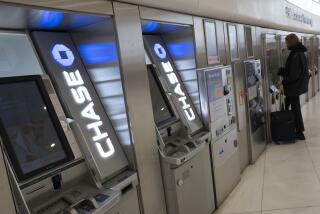BofA debit card fee prompts animosity from coast to coast
In the volatile political air ignited by the nation’s economic struggles, $5 buys a lot more controversy than it used to.
The announcement by Bank of America Corp. last week that it would charge customers $5 a month to use their debit cards has rung up animosity from coast to coast.
Coming amid growing anti-Wall Street protests, BofA’s new fee has become a focal point for anger and frustration about the flailing economy and Washington’s attempts to help the nation recover from the financial crisis.
Some banks are testing similar, though lower, debit card fees. But BofA was the first major player to take the plunge. And since it is the nation’s largest bank — as well as the beneficiary of one of the biggest taxpayer bailouts — the move has put a target on its red-white-and-blue logo.
“It’s one example of why I’m here and outraged,” said Julia Lum, 25, of Oakland, a law student and intern at a Washington firm who joined protests this week against large banks.
A BofA customer herself, Lum said she was ditching the bank because of the fee.
In Los Angeles, police arrested 11 protesters who marched into a BofA branch Thursday and refused to leave after trying to cash a giant check for $673 billion made out to the “People of California.” Protesters continued their efforts Friday with a march through downtown L.A.
“This frankly is just an incredible marketing and PR debacle,” said Bert Ely, an independent banking analyst. “They roll this thing out with no testing, make it nationwide, it’s higher than anybody else. What kind of reaction do they expect?”
Probably not what they’ve seen over the last week.
President Obama and Vice President Joe Biden both publicly criticized the fee, which BofA said was triggered by revenue losses from a new federal limit on what banks can charge retailers to process debit card transactions.
Sen. Dick Durbin (D-Ill.), who championed the limits on so-called swipe fees, urged BofA customers to “get the heck out of that bank.” And Rep. Brad Miller, a Democrat from the bank’s home state of North Carolina, introduced legislation to make it easier for customers to close an account.
When BofA Chief Executive Brian Moynihan appeared on stage Wednesday at the Washington Ideas Forum, the first question from interviewer Larry Kudlow of CNBC was about the fee.
“It’s the most famous five bucks in the history of this country,” Kudlow said.
Moynihan defended the fee, which he said was an attempt by BofA to be transparent about what it charges its customers for services. He said many customers won’t pay the fee, which takes effect next year, because it will be waived for those with a BofA mortgage or at least $20,000 in their combined accounts.
Customer reaction has been mixed, said BofA spokeswoman Anne Pace.
“For the most part, there’s questions: ‘What does this mean? What is included in the fee? How does it impact me? How can I avoid it?’” she said.
Despite the administration’s response, politicians in Washington had mixed reactions as well.
Many Democrats said the debit card fee showed the need for more rules to keep banks from taking advantage of their customers. But some Republicans said it showed the negative ramifications that can be caused by regulations.
Miller had been working on his Freedom and Mobility in Banking Act for months. But when BofA’s new fee landed, he decided the time was right to introduce the bill.
“I think the public is reacting to a sense of entitlement by the biggest banks — that they are entitled to whatever fees they charge, and if they get in trouble, they’re entitled to have the government rescue them,” Miller said.
BofA received $45 billion in bailout money in 2008 and 2009, as did Citigroup Inc., the most of any bank. BofA repaid the money in late 2009, and the government ended up making a $4.6-billion profit from dividend payments and stock warrants, according to the Treasury Department.
But resentment remains.
“There’s this overwhelming gut reaction to Bank of America putting in a $5 fee,” Biden said this week, citing the bailout as a main reason. “At a minimum, they are incredibly tone-deaf.… And at a maximum, they are not paying their fair share of the bargain here.”
Obama said the fee justified the creation of the new Consumer Financial Protection Bureau to make sure customers are treated right. He said banks “don’t have some inherent right just to, you know, get a certain amount of profit, if your customers are being mistreated.”
Republicans pounced on that comment. They said government “price-fixing” of debit card swipe fees was the reason BofA had to institute the new charge.
“At the end of the day, it is the consumers who are going to be paying the price, and we are already seeing that play out,” said Sen. Bob Corker (R-Tenn.).
But as for BofA, he quickly noted, “I am not here to defend them.”







